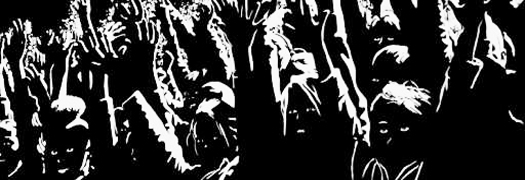
Features | Lists
By The Staff
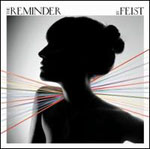
20 :: Feist
The Reminder
(Interscope)
“Feist, you whore.”
My sister and I are watching the late-night movie, Fried Green Tomatoes, and Idgie has just gotten Ruth away from her asshole husband when the iPod commercial comes on: white space, acoustic strumming, a smoky voice that kisses the back of your neck, 1-2-3-4, and my sister just can’t keep it in anymore: “Feist, you whore.”
“Whore?” I say. “Why whore? Wait, don’t answer. I know. I know you. It’s because she sold out to an adult-contemporary listenership eager for some aural cotton candy, right? Or worse, she never had any of the ‘edge’ that makes real selling out possible in the first place. Feist is an easy listen, nothing abrasive, no post-anything, no politics. Just a voice of distilled sex and such simplicity you can’t help laughing at every musician who scales auditory cliffs trying to reach new heights and eventually dies of altitude sickness. She doesn’t represent any of the innovation and frantic energy and struggle that you admire, but that isn’t even what bothers you. No, what drives you crazy is that she makes it sound so damn good.
“See, Feist-as-sellout is an easy shot to take. Almost expected, really. It’s a straw man argument—but the thing is, Feist can spin straw into a golden pop song. Scratch that: thirteen golden pop songs.
“It’s like . have you seen the music snob’s Venn diagram? One circle is labeled ‘Music I Like,’ the other is labeled ‘Music You Like,’ and the sliver of overlap between the circles is ‘Music I Used To Like.’ It’s funny ‘cause it’s true. Feist lives and works in that little sliver of contempt, destined to be disliked by many critics simply for being likeable. She’s sealed into that overlap and running out of air, but The Reminder has her banging on the wall screaming, ‘God fucking dammit, you can’t keep me here! I saw your toes tapping, so let me the hell out!’
“How can you not admire that? How can you deride something so true to itself, so determined to be tender? Idgie’s not going to give up on Ruth, and Feist is not going to give up on turning white bread into a gourmet meal. As a result, neither of them are ever going to be a Luke Skywalker or Aretha Franklin, but they’re still doing something important. They’re making people happy. They’re making me happy.”
I realize that I am standing on the coffee table. Nevertheless I exasperatedly pant, “You know what I mean?”
My sister just stares into the screen until the next round of commercials, after Ruth’s abusive husband is found dead, hurrah, and the iPod commercial comes on again.
“…Whore.”
Jessica Faulds
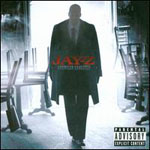
19 :: Jay-Z
American Gangster
(Roc-A-Fella)
I was convinced this was going to be a terrible record. The movie is “nah” and Jay’s latest one was definitely not Kingdom Commatic. He’s getting up there and, much worse, he’s rapping about it. Add to that all the shit Hov’ was talking to the press: apparently his new record was going to be just like all the Jay records everyone likes, and not like any of the crappy ones. What a coincidence!
But Oh. Shit. It is. I haven’t been this shocked by a return to form since The Beatles exhumed “Free As A Bird.” Whether Jay, post-bomb, had something to prove or found new-found freedom in a character, he’s on point throughout, proving once again that he’s best working quickly and thinking on his feet. “Pray” starts out on a properly letterbox note, and the drama just keeps rolling through I-defy-you-not-to-rock jams “Roc Boys” and “Ignorant Shit.” The beats are so hot Jay could’ve just slept on them, but instead he bobs and weaves, keeping the rhythm off balance. You don’t think it gets any better than this and then it does: “American Gangster.” It’s a late-career highlight that’s everything that “Show Me What You Got” should’ve been. In an utterly bizarre reversal of roles, Just Blaze is so hot that Hov’s task is just to keep up; when he does, it’s magic.
No doubt, this is one of the good ones. Why Jay-Z fires and misfires in equal measure is a matter for only fruitless speculation. What American Gangster proves, however, is that ‘Hov is always only a flop or two away from greatness.
Traviss Cassidy

18 :: Boris & Michio Kurihara
Rainbow
(Pedal/Drag City)
Every new Boris LP comes as something of a shock, sure, but by now that shouldn’t be so surprising given the technical virtuosity that these three band members bring to each style of music they attack. On Pink (2005) we saw Boris at their most squalling, a brutal rock band your eardrums could just deal with; on Altar (2006) we saw them team up with Sun 0))) to drone up a storm. But what’s critical about the affect of Rainbow is not just the switch; with the help of Ghost guitarist Michio Kuihara, the band has suddenly become the best shoe gazing psych-rock band in recent memory. “Recent memory” since they don’t quite have it down to a science and Rainbow has its share of weak moments, but whatever: those are overshadowed by the towering genius of tracks like “You Laughed Like a Watermark” and “Sweet No. 1.” There are moments on this record where everything falls into the background and you can only remember how great and powerful rock music can be.
Peter Hepburn
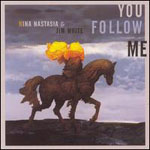
17 :: Nina Nastasia & Jim White
You Follow Me
(Fat Cat)
Band lineups tend towards the complimentary, so it’s refreshing to hear such a simple but effective inversion as the foil. Each side of the dichotomy live in the one world of the art piece, and their existences in that context lean heavily on one another, but the point is their difference. “So much depends upon a red wheel barrow glazed with rain water beside the white chickens,” indeed.
Appreciating the use of the foil doesn’t get much easier than listening to Nastasia’s poetic folk and White’s contrapuntal, jagged drumming as they canter together. The two revel in the space afforded by a proper band’s absence; the drums are more flighty, depart on greater excursions than those usually reserved for the guitar, which here plays a steadying, rhythmic role as well as a melodious one. Steve Albini’s production acts as an enabler, ensuring that the contrast is preserved, as if he were supplying a nearly barren, concrete room, a solitary table and two chairs, where a frank discussion is to take place.
For an album with real grit, it also has a remarkable sense of the micro, something usually made possible by the precision of electronic, or overproduced, albums. You can hear Nastasia’s intake of breath on “I’ve Been Out Walking,” even as White dials down the dynamics of his calculated mess. You Follow Me is a model of few moving parts, a starkly beautiful one masterfully performed by two voices creating a unique harmony.
Conrad Amenta
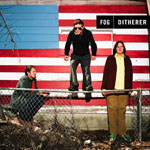
16 :: Fog
Ditherer
(Lex)
I think I’ve held my tongue more than some of the writers on this site, or on other sites, though its not like it was a conscious decision or something. There’s mad, there’s “letter to the editor mad,” and then there is “I’m just going to go on a rant right now and no one is going to stop me unless my editor does.” So allow me:
Every year indie rock dies, every year indie rock is reborn, every year we all line up to suck (or bite to bleeding) the udders that poke through our musical cages like so many overfed pre-skillet swine. Welcome to the slaughter, processing, and packaging of the “freak folk” movement, French techno, Italian disco, dance punk, hip-hop, minimal house, noise, and “grime-slash-dubstep.” All this and more now available from the World’s Largest Indie WebsiteT, Over 1 Billion Served, with a special thanks to some of the bigger names in Corporate America for their continued patronage through ad dollars spent because of some “surprising” demographic research. Using “indie rock is the consummate entry level genre” to question someone’s career trajectory, coming from the glowing hellfire of Pitchfork Media, means about as much to me as “Mission Accomplished” from the lips of George W. Bush. Here’s a year-in-review for you: celebrate a slew of average records by established and generally unexciting (or worse) indie rock bands like Okkervil River and Arcade Fire and then take a shit on Fog? Fuck that.
As mainstream as my taste may be, I don’t feel like a strong candidate to argue for the importance of indie rock, which is good because (deep breath) I also recognize that’s not what’s at stake here. It’s the fact that a record I like got a bad review. Petty, perhaps, but Andrew Broder, in his “traditional garb,” looks and sounds great—and I think that’s because the album itself is far from traditional. The epic “On the Gallows” moves through its narrative with sustained suspense and intensity, refusing to feel unfocused even during the feedback/noise/drum sections that bring the song’s first and second halves to a close with one very powerful chord. It’s chilling stuff. The song immediately preceding, “Your Beef Is Mine,” is a spooky father/son ballad that has some of the starkest imagery of the year and reminds me in no way of Primus. “Hallelujah Daddy” features Why? and a gospel chorus over some Slash-esque guitar line. Andrew Bird is on here; so is his pal Dosh. There is a song called “Inflatable Ape Pt. 3.” What else can I tell you? Indie is dead, long live indie.
Craig Eley

15 :: Ned Collette
Future Suture
(Dot Dash)
Over this last summer I saw Ned Collette open for Wheat at the Empty Bottle here in Chicago. It’s a fun venue but a lousy place to be an opening band, especially if you happen to be an unknown singer-songwriter opening for a marginal pop band on a weeknight. There were two dozen people in the place and most of them didn’t much care about the lanky Australian guy up onstage with the looping pedals. I was half-distracted by the bar chatter but mostly just blown away by Collette. I loved his debut, last year’s Jokes & Trials (still inexplicably unavailable in this country), and was expecting something light, sometimes funny, and vaguely lovesick along those lines. But what he was playing at the show were longer, wordier, and stranger numbers. The darkness and melancholy was palpable and startling.
The show reminded me quite a lot of seeing Joanna Newsom playing solo at McCarren Pool in Brooklyn a few months before Ys (2006) came out. Collette, who has toured with Newsom, has that same emotional intensity and incisive way with words. But where Newsom has the air of some eerie lost folk musician of the early ’70s, Collette brings to mind nothing so much as the austerity and beauty of early Leonard Cohen. He can do wordy and mysterious (“Forty Children”), but he doesn’t shy away from bluntness when it’s called for (“Ned’s Dream”). He is anachronistic, possibly, but in the best ways.
What comes as a surprise about Future Suture, then, is not the sheer imposing genius of the lyrics and the general gloominess of the album, but how goddamn great this record is to listen to. Like Newsom he has upped the instrumental ante for his sophomore record; unlike her, he’s gone classic rock. Aaron Newell’s right about the Dungen-like air to some of this, even if to me it sounds more like Songs of Leonard Cohen (1967) if Cohen had actually liked all the parts that weren’t just vocals and guitar. But what’s most important is that Collette isn’t just layering shit on to expand his sound. The arrangements make internal and conceptual sense so that there’s nothing tacked-on or unnecessary about the horns on “Race,” those big, warm, fuzzy synth lines on the gorgeous “The Country With a Smile,” or the drums anywhere on this album. Every listen seems to bring out something new; every listen and I love this album more.
Peter Hepburn
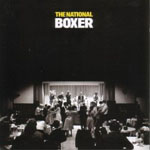
14 :: The National
Boxer
(Beggar's Banquet)
First off, those drums. While none of the snare and kick drum patterns played by Bryan Devendorff on Boxer are particularly complicated, their placement in the mix renders them downright primal, driving “Mistaken for Strangers” and “Squalor Victoria” with a fervor not usually associated with bands that most critics would refer to as “slow-burning.” Boxer is a drummer’s album.
Fellow CMG scribe Sean Ford once noted that the Strokes are a great band for when you’re living in the city in your early 20s, while the National are a better fit for, say, your late 20s, early 30s. It’s true. I’m 28, recently engaged, and part of the reason I’m so drawn to this band is that for once I can actually relate to the lyrics. Matt Berninger dares populate his songs with tales of “showered and blue-blazered” people in believable relationships, ranging from the mildly intoxicated bloke at the lame party who wants nothing more than to get back home to his girl (the gorgeous “Slow Show”), to the domestic couple who are more than willing to spend a night in and “stay inside until somebody finds us, do whatever the TV tells us” (“Apartment Story”).
Irrespective of the intense drumming, Boxer is less frantic than 2004’s acclaimed Alligator. Berninger never shreds his vocal chords, and the album is purposely bereft of a fuzz anthem like “Mr. November” or “Lit Up,” opting for a controlled elegance that, in fully revealing its charms, takes even longer than Alligator. But it also doesn’t suffer from their breakthrough’s filler problems – cough “Looking for Astronauts” cough – and the string and horn arrangements courtesy of honorary 6th member (and touring violinist) Padma Newsome are more indelibly realized than ever. The end result is a classy record to which anyone can relate, but will feel especially poignant to those who, like Berninger’s characters, are forced to come to grips with the realization that they ain’t so young anymore.
David M. Goldstein

13 :: Of Montreal
Hissing Fauna, Are You The Destroyer?
(Polyvinyl)
Why suffer for fashion when you can sing with no pants on? Everyone’s favorite bottomless troubador came back to the, ahem, big time this year with a January release that is as catchy as the Kongsvinger winters are dark. When Hissing Fauna first leaked over a year ago, I’m pretty sure I remember someone on the staff jokingly saying that we do a feature of the best records of 2007. We nervously shrugged it off — RIAA paranoia is, seriously, everywhere, but we might have had a real promo copy. Still, to claim best of ’07 at the time would have either been a stupid joke about leaked records or a needlessly audacious claim. Of course, we would have been right. Damn, no one will ever accuse this site of being cutting edge again! (Did we review that Radiohead album yet? I kid!)
From the opening notes of “Suffer for Fashion,” I’m on board with Barnes’ call to “emote to your dead.” The album has almost no weak spots, but I’m particularly won over by the “Heimdalsgate-Gronlandic-Kongsvinger” triple threat, where a comparatively mellow bass-heavy groove track is sandwiched between two druggy and glamorous and generally spectacular pop songs. The story of this record — and there are, in fact, albums with absolutely no interesting stories — is that it’s a divorce record. Indeed it is, but one that ultimately emotes more life than death, screams more than cries, and “laughs way too much.” I do, too, every time I take it for a spin.
Craig Eley
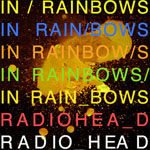
12 :: Radiohead
In Rainbows
(Self-released)
In Rainbows is not even in my top three Radiohead albums. Not even top five, actually. Hail To The Thief (2003) squeaks in above it because I really like “There There” and “Sit Down. Stand Up,” plus that album as a whole has a way better drum sound. For Radiohead, In Rainbows isn’t such a staggering achievement. And yet, despite my complaining, there it is, that persistent phrase moderating all of my bellyaching about this album: for Radiohead. If some other band’s name was attached to this batch of songs, I’d be dizzy with discovery, forcing the album on friends but then snatching it back, mine, mine, mine. Of course, critics are drooling over In Rainbows—it’s a damn good album. I don’t count myself among the slick-chinned only because of the enormous burden, the ten-bazillion-ton weight of expectation that I attach to one skinny British guy with a lazy eye (and, to be fair, the rest of his skinny British-guy band).
So the album may have some trouble living up to the rest of Radiohead’s catalogue, but the band nevertheless performs pretty well when stacked up against anyone but themselves. The material still manages to tie technical innovation into a kind of bluesy simplicity that has me clenching my teeth to hold back some sort of wordless guttural response. Thom Yorke sings beautifully, as always, the electronics are cutting edge, as always, and Johnny Greenwood lends the whole thing some high-cheekboned mystique. As always. “15 Step” epitomizes everything to love about In Rainbows. It boasts a badass bass line and surprisingly subtle guitar work (yes, guitar! and subtlety!), and samples of children shouting inject some pure joy into the proceedings. On the other hand, “Four Minute Warning” (it’s on disc two, cheapskate) plucks at heartstrings with little more instrumentation than voices and a guitar.
This, in other words, is Radiohead at some other band’s finest.
Jessica Faulds

11 :: Animal Collective
Strawberry Jam
(Domino)
Dear Animal Collective, I think that Strawberry Jam is your best album ever except for Here Comes the Indian. Also: how come nobody else I know likes Here Comes the Indian? Anyway, so Strawberry Jam should be your most popular album, right? That’s cool. I really like how you don’t sound like a band anymore and instead you just sound like a bunch of buzzing stuff. That was kind of what you sounded like on Here Comes the Indian except now you’re less scary and I’m less scared and we can high-five and write notes to each other in class. I mean, I like Panda Bear’s album too, but that one’s pretty same-y and this is way better, and it’s pretty and kooky and weird like Geologist’s head lamp. We should go skating together wearing knit caps and wielding icicles and singing “For Reverend Green” in cold air. Sung Tongs would melt the ice and Feels would sleep upon it but Strawberry Jam would be the best starry night ever, except for Here Comes the Indian. But even though I would love to just hang out with you singing Here Comes the Indian all night alone on ice and maybe with some hot chocolate my parents taught me to share so we can sing Strawberry Jam instead. Anybody else who comes has to bring their own hot chocolate, though.
PS: When you say “bone face” at the beginning of “Peacebone,” is that a Mobb Deep reference? Sweet!





